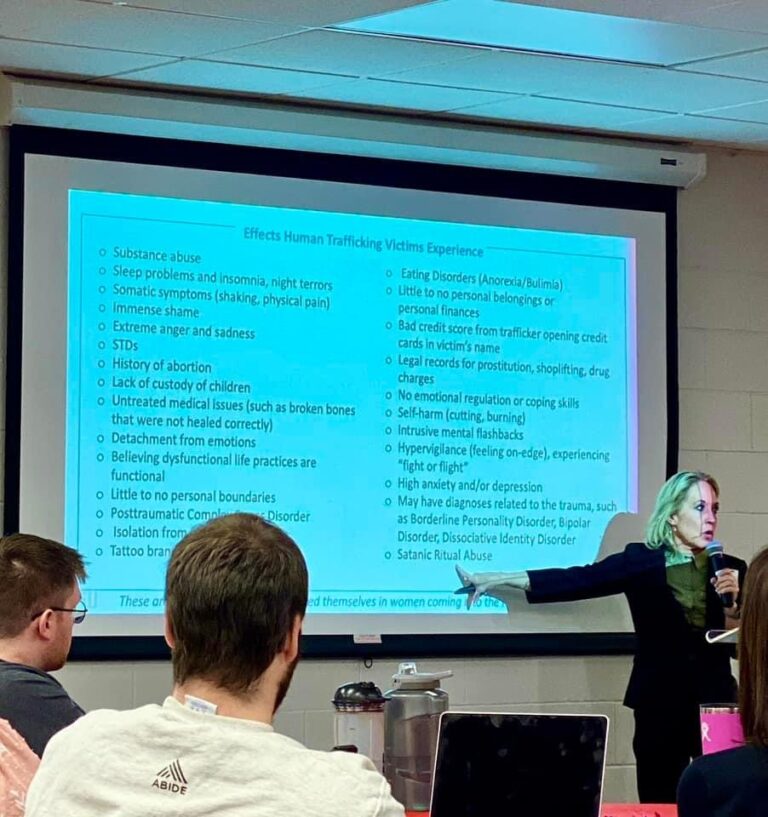Human Trafficking Consulting Services

Victims Rights
Government Affairs & Lobbying
Online Staff Development & Mentorship
Online Staff Development and One-to-One Leadership Mentoring Program
Residential Home & Program
Develope and Create Trauma-Informed & Trauma-Focused Policies
Staff Training
Human Trafficking Policies & Staff Training
Human Trafficking Virtual Training
Training Online for Volunteers, Staff and Board Members. Ensuring that even board members understand the challenges of managing programs for survivors.
Program Curriculum
Program Development & Best Curriculum Options
Julie’s extensive experience and firsthand knowledge in serving survivors of human trafficking make her a valuable asset to any organization or agency working in this field. Her expertise in trauma-informed care, research, training, and community organizing ensures that the services, training, curriculum, and policies she develops are not only effective but also sustainable.
Incorporating equine therapy into her programs demonstrates Julie’s commitment to providing holistic care for survivors of complex trauma. Equine therapy can be incredibly beneficial for individuals who have experienced trafficking and other forms of abuse, offering them a unique opportunity for healing and growth.
Julie’s offer to observe and consult with other programs and agencies reflects her dedication to collaboration and improving services across the anti-trafficking sector. With her leadership and insights, she continues to make a meaningful difference in the lives of survivors and in the fight against human trafficking.
Contact me for more information at [email protected]
Consulting Services
Creating trauma-informed and trauma-focused programming for short and long-term housing for survivors of human trafficking is crucial for their healing and recovery. Here’s a review, proposal, and guidance for developing such programming:
Review of Existing Programs: Begin by reviewing existing trauma-informed programs for survivors of trauma, abuse, and human trafficking. Identify successful models, best practices, and areas for improvement.
Assessment of Needs: Conduct thorough assessments to understand the specific needs and experiences of the survivors you will be serving. This may involve interviews, surveys, or consultations with trauma experts.
Creating a Safe Environment: Ensure that the housing facility provides a safe and welcoming environment. This includes physical safety measures, such as secure locks and surveillance cameras, as well as emotional safety, with supportive staff and clear boundaries.
Trauma-Informed Approach: Adopt a trauma-informed approach throughout the programming. This involves understanding the impact of trauma on individuals and integrating this knowledge into all aspects of care, including policies, procedures, and interactions with survivors.
Individualized Care Plans: Develop individualized care plans for each survivor based on their unique needs, preferences, and goals. These plans should be flexible and responsive to changes in the survivor’s circumstances or needs.
Therapeutic Support: Provide access to trauma-focused therapy and counseling services. Offer a variety of therapeutic modalities, such as cognitive-behavioral therapy, EMDR (Eye Movement Desensitization and Reprocessing), art therapy, and equine therapy, to address the diverse needs of survivors.
Skill Building and Empowerment: Offer programs and workshops focused on skill-building, empowerment, and self-care. This may include vocational training, educational opportunities, financial literacy, and personal development workshops.
Supportive Community: Foster a supportive community environment where survivors can connect with peers, build relationships, and access social support networks. Encourage participation in group activities, support groups, and community events.
Holistic Wellness: Take a holistic approach to wellness by addressing survivors’ physical, emotional, mental, and spiritual needs. Provide access to healthcare services, nutritious meals, fitness activities, mindfulness practices, and spiritual support.
Transitional and Aftercare Services: Develop comprehensive transitional and aftercare services to support survivors as they transition to independent living. This may include assistance with housing, employment, education, legal advocacy, and ongoing counseling.
Staff Training and Support: Ensure that staff members receive specialized training in trauma-informed care, crisis intervention, boundary setting, cultural competence, and self-care. Provide ongoing supervision, support, and professional development opportunities for staff.
Evaluation and Continuous Improvement: Implement mechanisms for evaluating the effectiveness of the programming and gathering feedback from survivors. Use this information to make data-driven decisions and continuously improve the quality of services provided.
By following these guidelines and incorporating trauma-informed principles into all aspects of programming, you can create a supportive and empowering environment for survivors of human trafficking to heal and thrive.

Julie’s extensive experience and firsthand knowledge in serving survivors of human trafficking make her a valuable asset to any organization or agency working in this field. Her expertise in trauma-informed care, research, training, and community organizing ensures that the services, training, curriculum, and policies she develops are not only effective but also sustainable.
Incorporating equine therapy into her programs demonstrates Julie’s commitment to providing holistic care for survivors of complex trauma. Equine therapy can be incredibly beneficial for individuals who have experienced trafficking and other forms of abuse, offering them a unique opportunity for healing and growth.
Julie’s offer to observe and consult with other programs and agencies reflects her dedication to collaboration and improving services across the anti-trafficking sector. With her leadership and insights, she continues to make a meaningful difference in the lives of survivors and in the fight against human trafficking.
Contact me for more information at [email protected]